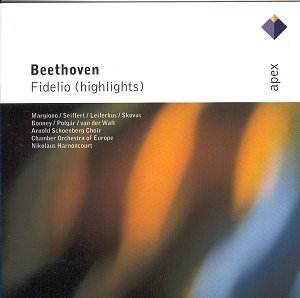Upon receipt of the text of Bouilly’s drama Beethoven
abandoned a partly completed work based on a libretto by Schikaneder
of Magic Flute fame. Was this because of identification with one, or
even two, of the characters, in much the same way that first novels
often have more than a suggestion of the autobiographical? Here was
the rejected marriage proposer (Beethoven to the widow of Count Deym
– Jacquino to the gaoler’s daughter Marzelline); and, as has been suggested
by many, the isolationism for Beethoven resulting from his deafness
compared with Florestan’s below ground cell.
The accompanying notes remind us that Bouilly’s drama
was based on a true story of the French Revolution. Politics dictated
that the librettist set the story in Spain and an earlier century. The
two page opera history notes are helpful. However, I have serious reservations
about including in the synopsis, comments on arias and ensembles that
do not appear in the highlights as presented on this CD.
The opera opens with emotion on the domestic scale
and builds quickly to the grand scale. The overture is a strong statement
of intent. Whilst there are moments of uneven tempi there are some interesting
phrasings in this crisply delivered overture. It concludes somewhat
frenetically rather than prophetically.
Barbara Bonney as Marzelline provides an early high
point. Her aria O wär’ ich schon mit dir vereint thinking
of the (crossed dressed Leonore now Fidelio) is delivered with beautiful
clarity of notes and longing tones. Deon van der Walt is her rejected
suitor Jacquino. He reins back his voice to present a clear toned gentle
simple suitor.
Rocco, Marzelline’s father, sung by Lázló
Polgár has a gloriously brown deep voice for the (spoken) recitative,
some of which is included. His is the ‘gold’ or ‘money’ aria Hat
man nicht auch Gold beineben. The glory of his spoken tone appears
to fade slightly in the aria. It is not the most expressive rendering.
He is not helped by occasional over enthusiastic orchestral accompaniment.
Such over enthusiasm occurs again in Sergei Leiferkus’s
prison governor’s prematurely triumphal aria but not before we have
been treated to a real edge to his timbre so appropriate to the governor’s
vicious nature.
Charlotte Margiono sings Leonore. High notes held effortlessly;
vocal leaps accomplished with pinpoint accuracy; perhaps just a little
light on expression but tonal beauty compensating for that; this is
an accomplished performance.
Peter Seiffert as Florestan is deprived of the opening
doom and gloom of his aria. These highlights start later in the aria
with hope; which dis-enables Seiffert from given the grand contrast
of tone and expression. He conveys vocally the joy of release from his
cell whilst matching well with Margiono in the finale. Indeed in the
ensembles all the voices balance well. In the earlier ensembles each
can be distinguished pleasurably. In the finale the chorus joins with
the orchestra to provide some mighty sounds reminiscent of the Choral
Symphony.
Robert McKechnie


